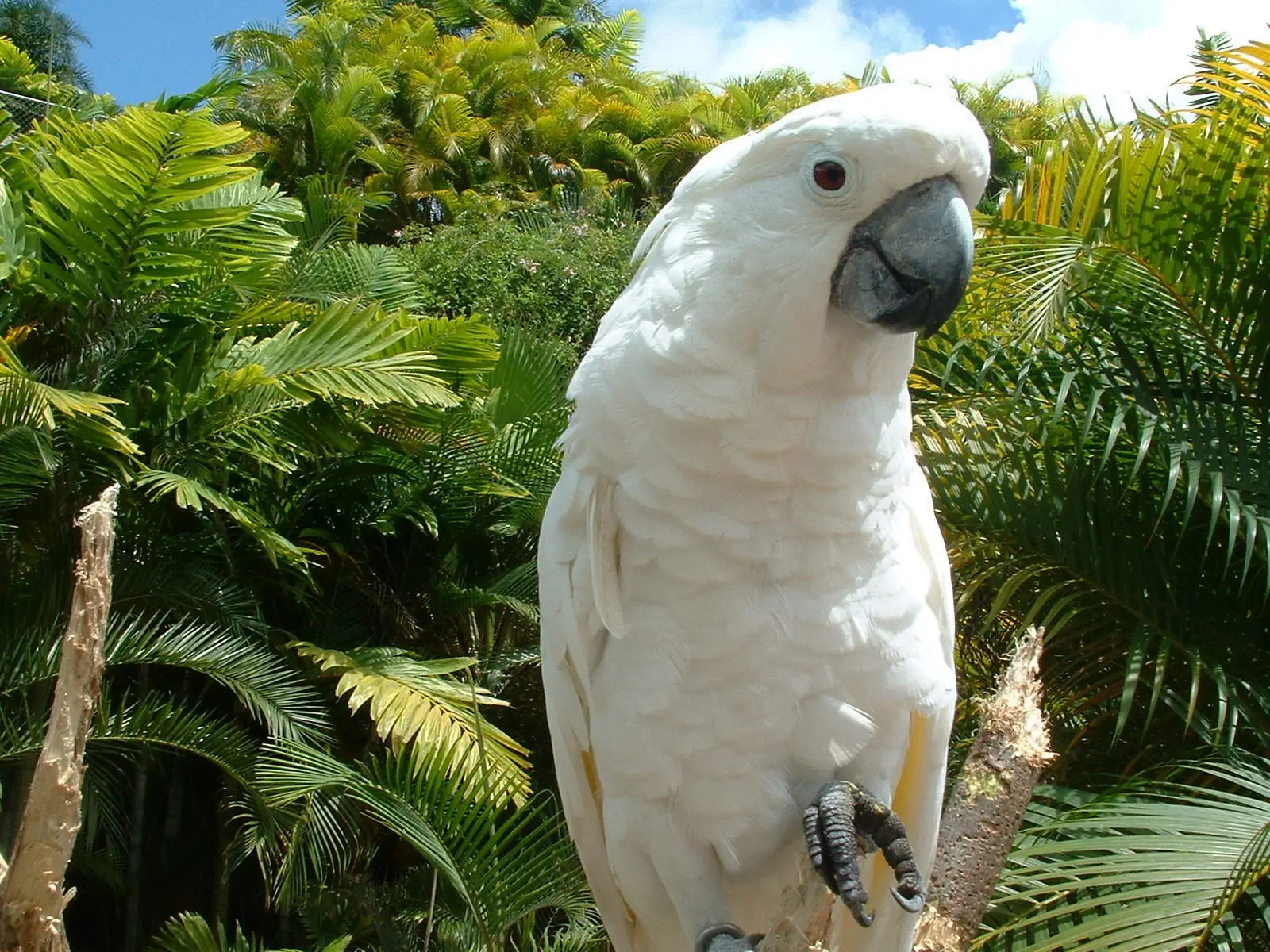Cockatoos stand out in the avian world with their distinctive crests and varied colors, ranging from the striking black of the Palm Cockatoo to the pure white of the Umbrella Cockatoo. These birds are not just about looks; their intelligence and ability to form strong bonds make them fascinating companions. However, owning a cockatoo requires understanding their complex needs, including a diet rich in variety, ample space for exercise, and engaging activities to stimulate their sharp minds. This introduction aims to shed light on the unique aspects of cockatoos, providing essential insights for anyone considering these charismatic birds as pets or simply looking to learn more about their intriguing nature.
Key Takeaways
- Cockatoos are diverse, with each breed having unique characteristics; knowing the specifics of the breed you’re interested in is crucial for a compatible match.
- Regular veterinary check-ups and a balanced diet are essential to maintain a cockatoo’s health, highlighting the importance of proactive care.
- Understanding and meeting a cockatoo’s complex emotional and physical needs can lead to a rewarding companionship, underscoring the need for dedicated time and attention from their owners.
- Cockatoos require a stimulating environment with plenty of space to explore and toys to play with, emphasizing the importance of an engaging habitat.
- The decision to bring a cockatoo into your home should not be taken lightly, considering their long lifespan and the commitment required to care for them properly.
- Engaging with a community of cockatoo owners or experts can provide invaluable support and insights, making it a recommended step for both prospective and current owners.
Breed Overview
History
Cockatoos trace their origins to Australia, Indonesia, and the Philippines. These regions offer diverse habitats supporting the varied species of cockatoos. In Aboriginal Australian cultures, cockatoos hold significant places. They appear in symbols and storytelling, reflecting their integral role in indigenous life.
European colonization brought drastic changes to their environments. It led to habitat loss and a decline in some cockatoo populations. Despite these challenges, cockatoos have remained resilient, adapting to changing landscapes while maintaining their presence in their native lands.
Physical Characteristics
One of the most striking features of cockatoos is their distinctive crest of feathers. This crest can be raised or lowered to signal different moods. The variety in color among species is remarkable. It ranges from the primarily white Sulphur-crested Cockatoo to the vibrant pink and grey Galah.
Their strong beak is another key feature, designed for cracking nuts and seeds. This adaptation showcases their evolution as skilled foragers in wild environments.
Personality and Temperament
Cockatoos are known for their social nature. They often form large flocks in the wild, highlighting their need for community and interaction. Their potential for loud vocalizations serves as a natural form of communication within these groups.
Their intelligence is notable, with many species able to mimic sounds and words. This trait has made them popular pets but also means they require plenty of mental stimulation to stay happy and healthy.
 Creator: Ashraf Saleh
Creator: Ashraf Saleh
Health And Care
Common Health Issues
Cockatoos face several health challenges that require careful attention. Psittacine beak and feather disease (PBFD) is a serious viral condition. It leads to feather loss, beak deformities, and can be fatal. Owners must monitor their birds for early signs of illness.
Obesity is another concern for these birds. Lack of exercise and high-fat diets contribute to this issue. Regular vet check-ups can help manage their weight.
Self-mutilation and feather plucking are distressing behaviors. They often stem from lack of attention or mental stimulation. Providing an enriching environment is crucial for their well-being.
Dietary Needs
A balanced diet is vital for cockatoos’ health. Seeds alone are not enough. Fruits, vegetables, and nuts should also be part of their meals. This variety mimics their natural diet and keeps them healthy.
Calcium supplements are essential, especially for female cockatoos prone to egg binding. Owners should ensure their diet supports bone health.
Certain foods like avocado and chocolate are toxic to these birds. They must be avoided to prevent poisoning.
Exercise Requirements
Cockatoos need daily exercise outside their cage to stay fit. Flying and exploring help maintain their physical health. It also reduces the risk of obesity.
Interactive toys and puzzles provide mental stimulation. They keep cockatoos engaged and prevent boredom.
Supervised playtime outside the cage encourages physical activity. It’s an effective way to bond with them while ensuring they get enough exercise.
Grooming
Regular nail trimming prevents overgrowth and mobility issues in cockatoos. It’s a necessary part of their care routine.
Bathing or misting helps maintain feather health. It simulates rainforest conditions, which is beneficial for their skin and feathers.
Clean living spaces are crucial to avoid bacterial and fungal infections. A clean environment supports overall health and prevents diseases.
Living with a Cockatoo
Training and Socialization
Training and socializing a cockatoo is crucial from an early age. These birds are highly intelligent and can develop strong bonds with their human families. Early socialization helps prevent aggression and fearfulness towards humans and other birds. It’s important to introduce them to various people, settings, and other friendly birds under controlled conditions.
Using positive reinforcement techniques is key for training. Treats, praise, and affection work well to encourage desired behaviors. Remember, cockatoos have long memories. They remember both good and bad experiences vividly. This trait significantly affects their trust in humans and overall behavior. A negative experience can lead to lasting behavioral issues, making consistent positive interactions essential.
Environment
A suitable living environment is vital for a cockatoo’s wellbeing. Their cage should be spacious enough to allow for wing stretching and movement. Including safe, durable toys will help keep them entertained and engaged. It’s also important to place the cage in a quiet yet socially integrated area of the home. This placement helps reduce stress while allowing the bird to remain part of family activities.
Maintaining a consistent light-dark cycle mimics their natural habitat and supports healthy sleep patterns. Such cycles are crucial for their mental health as it prevents stress and erratic behavior caused by sleep deprivation or inconsistent daily routines.
Activities They Enjoy
Cockatoos enjoy a variety of activities that cater to their curious nature. Foraging toys and puzzles are excellent for satisfying their instinctual behaviors and keeping their minds sharp. These activities also prevent boredom, which can lead to destructive behavior if not addressed.
Regular interaction with family members through play and training sessions fulfills their social needs. Cockatoos thrive on attention and can become very attached to their human families when properly engaged.
Encouraging outdoor time in a secure aviary or through harness training provides necessary fresh air and sunlight exposure. Such activities not only enrich their day but also help maintain physical health by simulating a more natural lifestyle.
Misc.
Popular Names
Cockatoos, known for their vibrant personalities and striking features, often receive names that mirror these traits. Common choices like “Snowball” for a white cockatoo or “Sunny” for those with a sunny disposition are popular among owners. Some cockatoos even share names with celebrities, such as “Elvis,” inspired by the Sulphur-crested Cockatoo’s flamboyant crest resembling the King of Rock’s iconic hairdo. This trend highlights the deep bond between these birds and their human companions.
Traditional and indigenous names also play a significant role in naming these birds, reflecting their origins and cultural significance. Names like “Galah,” derived from Aboriginal Australian languages, honor their native habitat and heritage.
Fun Facts
Cockatoos can live up to 60 years or more, making them lifelong companions for many owners. Their longevity is matched by their contribution to ecosystem health through seed dispersal in their native habitats.
These birds have also shown remarkable problem-solving skills, including learning to use tools. Anecdotes of cockatoos crafting tools from raw materials to reach food or water showcase their impressive intelligence.
Common Myths
Contrary to popular belief, not all cockatoos are loud. Noise levels greatly depend on the bird’s personality and environment. Another myth is that cockatoos make ideal pets for everyone. In reality, they require high maintenance and commitment due to their long lifespan.
It’s also a misconception that cockatoos can eat anything. Their diet needs careful management to prevent health issues, emphasizing the importance of understanding their nutritional needs.
Most Similar Breed
Comparing cockatoos to macaws reveals similarities in intelligence, social needs, and lifespan. Both bird families thrive on social interaction and mental stimulation.
However, physical differences exist; macaws possess a stronger beak capable of cracking harder nuts and seeds. Vocalization patterns and social behaviors vary between the two, with macaws often being more vocal and expressive in different settings.
Closing Thoughts
Cockatoos offer a unique blend of companionship, intelligence, and beauty, making them highly sought-after pets. However, their care demands a significant commitment in terms of time, energy, and resources. Owners must ensure they meet these birds’ complex social, dietary, and environmental needs to foster their well-being. It’s crucial for potential owners to thoroughly understand the responsibilities involved in caring for a cockatoo, including regular health checks, providing a stimulating environment, and ensuring a balanced diet.
The decision to bring a cockatoo into one’s life should not be taken lightly. These birds thrive on attention and interaction, requiring dedicated care throughout their long lifespans. For those ready to embrace the challenges and rewards of living with a cockatoo, the experience can be deeply fulfilling. Anyone considering adding a cockatoo to their family is encouraged to research extensively and possibly consult with current owners or avian specialists. This proactive approach will help ensure that both the bird and its human companions enjoy a harmonious and happy relationship.
Frequently Asked Questions
What types of cockatoos are there?
There are over 20 species of cockatoos, including popular pets like the Sulphur-crested Cockatoo, Goffin’s Cockatoo, and Umbrella Cockatoo. Each species has unique characteristics and care needs.
How long do cockatoos typically live?
Cockatoos have a long lifespan, with many living up to 50 years or more in captivity when provided with proper care and nutrition. Some species can even live up to 70 years.
What are the primary health concerns for cockatoos?
Common health issues for cockatoos include obesity, feather plucking due to stress or boredom, psittacosis (a type of bacterial infection), and beak and feather disease. Regular veterinary check-ups are essential for early detection and treatment.
How should I care for my cockatoo?
Caring for a cockatoo involves providing a balanced diet, plenty of fresh water, regular exercise outside their cage, mental stimulation through toys and interaction, and maintaining a clean living environment. A varied diet helps prevent nutritional deficiencies.
Can cockatoos be trained?
Yes, cockatoos can be trained using positive reinforcement techniques. They are intelligent birds capable of learning a variety of tricks and commands. Consistency and patience are key in training them effectively.
Are cockatoos good pets for families?
Cockatoos can be good family pets if the family is prepared for a high-maintenance companion that requires significant attention and social interaction. They thrive in environments where they can form strong bonds with their caretakers.
What should I consider before getting a cockatoo?
Before getting a cockatoo, consider their long lifespan, need for daily social interaction, potential noise level, and the time and financial commitment required for their care. Assessing your lifestyle compatibility with these needs is crucial.
“Creator: https://www.animalia.bio/white-cockatoo








0 Comments